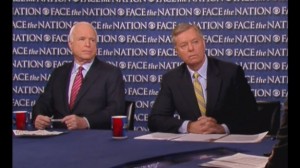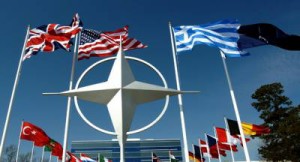NATO’s Strange Addition of Montenegro
Exclusive: Official Washington’s New Cold Warriors are painting NATO’s admission of tiny Montenegro in the stark black-and-white colors of a heroic stand against “Russian aggression” but that misses the real reasons why it’s a bad idea, writes Jonathan Marshall.
Any day now, Arizona Senator John McCain promises, the U.S. Senate will vote to approve the incorporation of Montenegro as the 29thmember state in the NATO alliance. Though few Americans likely know where to find the tiny Balkan nation on a map, Montenegro has become another dubious focal point of the West’s new confrontation with Russia.

Sen. John McCain, R-Arizona, and Sen. Lindsey Graham, R-South Carolina, appearing on CBS’ “Face the Nation.”
At first glance, the case for extending NATO’s umbrella over a country with fewer than 2,000 troops isn’t obvious. Its seven helicopters are unlikely to make America safer. The Obama administration, which championed this latest in a long line of recent additions to the alliance, actually offered as a rationale the fact that Montenegro had donated some mortar rounds to the anti-ISIS coalition in Iraq and $1.2 million to NATO’s operations in Afghanistan over three years.
That sum is less than a third of what U.S. taxpayers spend in Afghanistan per hour. One critic quipped, “if the West’s survival depends on Montenegro’s inclusion in NATO, we should all be heading for the bunkers.”
Maybe that’s why hawks are citing the mere fact of Russia’s predictable opposition as a prime reason to support Montenegro’s accession. “Backing Montenegro’s membership is not only the right thing for the Senate to do, it would send a clear signal that no third party has a veto over NATO enlargement decisions,” argues the Heritage Foundation.
And two advocates at the John Hopkins School of Advanced International Studies, writing in Foreign Affairs, declared recently that Montenegro will be the key test of whether President Trump and Secretary of State Rex Tillerson “kowtow to their friend Russian President Vladimir Putin” and “acquiesce . . . in another Yalta” or stand up for “core U.S. goals.”
Raising the specter of Putin and Yalta diverts attention from troubling questions about Montenegro’s political suitability as a partner — and whether it has anything of military value to offer.
NATO ostensibly conditions its acceptance of new members on strict criteria, which include “demonstrating a commitment to the rule of law and human rights; establishing democratic control of armed forces; and promoting stability and well-being through economic liberty, social justice and environmental responsibility.”
Deputy Assistant Secretary of Defense Michael Carpenter assured the Senate Foreign Relations Committee last September that Montenegro supported NATO’s “values of democracy, individual liberty, and the rule of law.” He must have missed the report from Freedom House, which gave the country a rating of only “partly free” for both political rights and civil liberties.
The organization cited “restrictions on the freedom of peaceful assembly” and “years of harassment and discrimination against LGBT people.” It also noted “ongoing concerns . . . about the independence of the judiciary and the public broadcaster, as well as numerous failures to effectively prosecute past attacks against media workers.” The country suffers from “a lack of trust in the electoral process among voters,” it added.
Carpenter must also have missed the State Department’s human rights report, which accused Montenegro of numerous violations, including “impunity for war crimes, mistreatment by law enforcement officers of persons in their custody, overcrowded and dilapidated prisons and pretrial detention facilities, violations of the right to peaceful assembly,” and “selective prosecution of political and societal opponents.”
A Bastion of Corruption
As for the “rule of law,” consider that Montenegro’s ruler for nearly three decades, Milo Djukanovi?, was given the 2015 Organized Crime and Corruption “Person of the Year” Award by the Organized Crime and Corruption Reporting Project (OCCRP), an organization of several hundred investigative journalists who report on corruption in Europe and Central Asia (and are partly financed by USAID).
Citing his success in “creating an oppressive political atmosphere and an economy choked by corruption and money laundering,” the OCCRP said Djukanovi? “has built one of the most dedicated kleptocracies and organized crime havens in the world.”
The organization pointed to his alleged role in cigarette smuggling with notorious Italian crime syndicates; his family’s takeover of a former state bank, which became a money laundry for organized crime; his controversial sale of major stretches of the country’s coastline to shady foreign oligarchs; and his offer of citizenship to a notorious regional drug kingpin.
Djukanovi? knows the money is greener to the west of Montenegro than to the east. That’s why he’s an ardent advocate of joining NATO. (Fewer than 40 percent of Montenegrins in a recent poll agreed — in part because alliance warplanes bombed the country during NATO’s campaign against Serbia in 1999.) President Obama congratulated Djukanovi? on his stand during an official reception in September.
Following national elections in October, Djukanovi? finally stepped down as prime minister, but he remains head of the ruling party. Taking his place as the country’s current prime minister was his hand-picked deputy, Dusko Markovic.
“Markovic, a former state security chief, is considered one of Djukanovi?’s closest confidantes,” reported OCCRP. “He was publicly accused by a former head of the country’s anti-organized crime police last year of involvement in cigarette smuggling, but was never charged.” In 2014, Markovic was also charged by the head of a government investigative commission with obstructing a probe into the murder of a prominent newspaper editor and critic of Djukanovi?.
Western media have large ignored such troubling facts. Instead, what little coverage there is of Montenegro focuses on the government’s sensational claim that Russians plotted to assassinate Djukanovi? at the time of the October election.
Markovic recently told Time magazine that his security services at the last minute uncovered a “criminal organization” formed by two Russian military intelligence agents, who planned on election day “to provoke incidents . . . and also possibly an armed conflict” as a pretext for taking power.
The prosecutor in charge of the case says “Russian state authorities” backed the plot to “prevent Montenegro from joining NATO.” He vows to indict two alleged Russian plotters and 22 others, including a group of Serbian nationalists, by April 15. Russia’s foreign minister calledthe allegations “baseless,” but refuses to extradite any suspects. An independent expert, citing numerous anomalies in the official story, argues the plot was a “rogue operation” by Serbian and Russian nationalist freelancers.
Russia, which has long considered the Balkans to be in its sphere of influence, has a history of intruding in Montenegro’s affairs. But absent persuasive supporting evidence for the government’s case, outsiders should bear in mind the cautionary observation by Freedom House that “[Montenegro’s] intelligence service has faced sustained criticism from international observers for a perceived lack of professionalism.”
Still, it should come as no surprise that anti-Russia hawks haven’t let ambiguous evidence deter them from demanding the expansion of NATO.
A Wall Street Journal editorial said the alleged coup plot “gives a good taste of Russia’s ambitions — and methods — in Eastern and Central Europe” and concluded with a call for accepting Montenegro’s bid to join NATO: “Western security is best served by supporting democratic governments of any size facing pressure from regional bullies. The alternative is to deliver another country into Moscow’s grip, and whet its appetite to take another.”
Time magazine commented even more breathlessly that “The aborted coup was a reminder that a new battle for Europe has begun. From the Baltics to the Balkans and the Black Sea to Great Britain, Vladimir Putin is seeking to rebuild Russia’s empire more than 25 years after the fall of the Soviet Union.” Trump’s past criticism of NATO, the magazine warned, has “raised flags that the U.S. might accept Russia’s territorial grab.”
Such inflammatory comments are stoking the political fires burning around Trump, including investigations of his campaign contacts with Russians, assertions of Moscow’s interference with the election, and questions about business connections or personal indiscretions that make him vulnerable to Putin. Trump’s stand on Montenegro — still to be determined — will signal whether he remains a critic of NATO or is caving to the New Cold Warriors.
Jonathan Marshall is author of many recent articles on arms issues, including “Obama’s Unkept Promise on Nuclear War,” “How World War III Could Start,” “NATO’s Provocative Anti-Russian Moves,” “Escalations in a New Cold War,” and “Ticking Closer to Midnight.”




Geen opmerkingen:
Een reactie posten